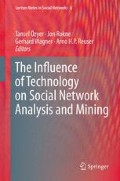Abstract
An effective and efficient approach in designing software systems to describe system requirements is using scenarios. A scenario, commonly shown as a message sequence chart or a sequence diagram, is a temporal sequence of messages sent between system components. Scenarios are appealing because of their expressive power and simplicity. Moreover due to the clear and concise syntactic of scenarios, they can be used to analyze the system requirements for general validity, lack of deadlock, and existence of emergent behavior. Emergent behavior or implied scenarios are specifications of behavior that are derived from compiling of all requirements together but are not explicitly specified in the set of scenarios. Although emergent behavior is not necessarily unwanted, nevertheless it is useful for system designers and engineers to be aware of its existence. Defining requirements using scenarios and conducting consequent analysis has been done for distributed systems as well as multi-agent system. In this research the requirements of a social network are described using scenarios. The scenarios are then used to detect emergent behavior using a systematic methodology. This is illustrated using a prototype of a social network of MAS for semantic search that blends the search and ontological concept learning.
Access this chapter
Tax calculation will be finalised at checkout
Purchases are for personal use only
References
Scott, J.: Social Network Analysis: A Handbook, 2nd ed. Sage, London/Thousands Oaks (2000)
Hanneman, R.A., Riddle, M.: Introduction to Social Networks Methods. Sage, London/Thousand Oaks (2005)
Unified Modeling Language Specification. Version 2. Available from Rational Software Corporation, Cupertino (2006)
ITU: Message Sequence Charts. Recommendation, International Telecommunication Union (1992)
Harel, D., Kugler, H.: Synthesizing state-based object systems from lsc specifications. Int. J. Found. Comput. Sci. 13(1), 5–51 (2002)
Kruger, I., Grosu, R., Scholz, P., Broy, M.: From mscs to statecharts. In: Rammig, F.J. (ed.) Distributed and Parallel Embedded Systems. Kluwer, Boston (1999)
Makinen, E., Systa, T.: MAS – an interactive synthesizer to support behavioral modeling in UML. In: ICSE 2001, Toronto (2001)
Uchitel, S., Kramer, J., Magee, J.: Synthesis of behavioral models from scenarios. IEEE Transaction on Software Engineering, Feb 2003, pp. 99–115
Whittle, J., Schumann, J.: Generating statecharts designs from scenarios. In: ICSE, Limerick (2000)
Whittle, J., Schumann, J.: Scenario-based engineering of multi-agent systems. In: Agent Technology from a Formal Perspective, 3d ed. Springer, London (2006)
Adsul, B., Mukund, M., Kumar, K.N., Narayanan, V.: Casual closure for MSC languages. In: FSTTCS, pp. 335–347. Hyderabad, India (2005)
Alur, R., Etessami, K., Yannakakis, M.: Inference of message sequence charts. IEEE Transaction on Software Engineering, July 2003, pp. 623–633
Muccini, H.: Detecting implied scenarios analyzing nonlocal branching choices. In: FASE 2003, Warsaw (2003)
Uchitel, S., Kramer, J., Magee, J.: Negative scenarios for implied scenario elicitation. In: 10th ACM SIGSOFT International Symposium on the Foundations of Software Engineering (FSE 2002), Charleston (2002)
Wasserman, S., Faust, K.: Social Network Analysis: Methods and Applications. Cambridge University Press, Cambridge/New York (1994)
Granovetter, M.S.: The strength of weak ties. Am. J. Sociol. 78, 1360–1380 (1973)
Granovetter, M.S.: Getting A Job: A Study of Contacts and Careers. University Of Chicago Press, Cambridge (1974)
Granovetter, M.S.: The strength of weak ties: a network theory revisited. Sociol. Theory 1, 201–233 (1983)
Wellman, B., Wortley, S.: Different strokes from different folks: community ties and social support. Am. J. Sociol. 96, 558–588 (1990)
Lin, N., Ensel, W.M., Vaughn, J.C.: Social resources and strength of ties: structural factors in occupational status attainment. Am. Sociol. Rev. 46, 393–405 (1981)
Burt, R.: Structural Holes: The Social Structure of Competition. Harvard University Press, Cambridge (1995)
Far, B.H., Zhong, C., Yang, Z., Afsharchi, M.: Realization of semantic search using concept learning and document annotation agents. In: Proceeding of Twenty-First International Conference on Software Engineering and Knowledge Engineering (SEKE), pp. 164–169. Boston, USA (2009)
Lally, A., Verspoor, K., Nyberg, E.: Unstructured Information Management Architecture (UIMA) Version 1.0 (OASIS, 2008) (2008)
Moshirpour, M., Mousavi, A., Far, B.: Detecting emergent behavior in distributed systems using scenario-based specifications. In: International Conference on Software Engineering and Knowledge Engineering, San Francisco (2010)
Mousavi, A.: Inference of emergent behaviours of scenario-based specifications. In: Department of Electrial and Computer Engineering, vol. PhD, University of Calgary, Calgary (2009)
Goldenson, D.R., Gibson, D.L.: Demonstrating the impact and benefits of CMMI: an update and preliminary results. CMU/SEI-2003-SR-009, Pittsburgh, Oct 2003
Mousavi, A., Far, B.: Eliciting scenarios from scenarios. In: Proceedings of 20th International Conference on Software Engineering and Knowledge Engineering (SEKE 2008), San Francisco, 1–3 July 2008
Author information
Authors and Affiliations
Corresponding author
Editor information
Editors and Affiliations
Rights and permissions
Copyright information
© 2013 Springer-Verlag Wien
About this chapter
Cite this chapter
Moshirpour, M., El-Sherif, S.M., Far, B.H., Alhajj, R. (2013). Detecting Emergent Behavior in a Social Network of Agents. In: Özyer, T., Rokne, J., Wagner, G., Reuser, A. (eds) The Influence of Technology on Social Network Analysis and Mining. Lecture Notes in Social Networks, vol 6. Springer, Vienna. https://doi.org/10.1007/978-3-7091-1346-2_17
Download citation
DOI: https://doi.org/10.1007/978-3-7091-1346-2_17
Published:
Publisher Name: Springer, Vienna
Print ISBN: 978-3-7091-1345-5
Online ISBN: 978-3-7091-1346-2
eBook Packages: Computer ScienceComputer Science (R0)

